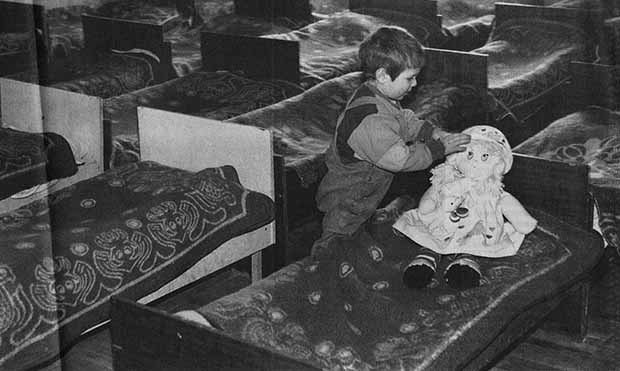Georgia’s Huddled Children Bleakly Awaiting Tomorrow
TELAVI, Georgia, January 15, 2004.: Finally, a few months ago, when the cracked walls of the dormitory seemed about to burst, a foreign aid group hired someone to put metal bands around the building to hold it together.
In the small, unheated rooms inside, there is a wool blanket on each of the wood cots, but no one has found the money to buy pillows.
”Everything is a problem for us,” said an administrator here at the Telavi Boarding House and School for Orphans and Abandoned Children. ”When a window breaks, we don’t know how to replace it.”
One of the children, Madona Pitskhelauri, 13, said that what she likes best is to watch television on the school’s one set, but this is not very often because it costs too much to run the generator.

Georgia is a country where cities are often dark at night because there is no electricity, where the winter air is sweet with wood smoke because there is no gas for heat, where low-paid teachers sell books at the roadside to earn a living.
It is a country where most people do not have regular jobs or travel abroad to find work, and where foster homes are crowded with abandoned children.
The wave of public fury that drove Eduard A. Shevardnadze from the presidency in November was not at heart about stolen elections, corruption or repression. It was because people in this once comfortable little nation are cold at night and hungry and jobless, without a pane of glass to fix a window.
In this country rich with fruits and vineyards, many people do not live much better than the 173 children at the boarding house in this city about 35 miles east of Tbilisi.
Some of the children, who range in age from 3 to 15, are orphans, but most have been abandoned or sent here by parents who cannot support them.
Now, though, in the shivering corridors of the boarding house as in much of the rest of the country, people are warming themselves with hope.
Their young new president — ”Misha the Revolutionary,” some people call him — seems to embody in his age, his American education and above all his energy and determination a bright and different world as each person imagines it.
”I expect that we’ve got a president who will start right away with the kind of children who come to this school,” said Dodo Zedelashvili, a deputy director here. ”There won’t be a need for schools like this and all the children can be raised by their families.”
The president, Mikhail Saakashvili, 36, has warned against extravagant hopes. He cannot simply reopen Georgia’s dead and empty factories, switch on the gas and electricity and start handing out paychecks to teachers and policemen.
But some people seem too desperate with relief and yearning to listen to him.
”After the revolution I go around happy all the time,” said the chief social worker here, Tina Gogiashvili. ”I have no father and no mother, I have no husband or children, and I ask myself, ‘Why am I happy all the time?’ It’s not just that we have a new president, but we have a new era.”
For now, it is a disembodied happiness as Georgia waits, as barren as a leafless tree, for its season to change. The smoky cobbled streets of Telavi, like those of other cities, are listless and its shops are mostly dark. Its men, standing in small clusters, seem exhausted by idleness.
The boarding school is quiet now too, with classes suspended for the holidays. But one-fourth of the children remain here, including a dozen preschoolers, with no one to take them in for the holiday.
”What can you say about parents who don’t even take their children home on Christmas Day?” said Omar Peikrishvili, who has run the foster home for 21 years and is a surrogate parent to the children here.
Mr. Peikrishvili does show the difference one person can make, maintaining his institution through force of will and hard work — painting walls, fixing furniture, hanging pictures, leading dance classes, celebrating birthdays. He has tried without much success to get supplies and textbooks for his classrooms.
”He is everything for us,” said Valery Vartanovi, 15, who has lived here since he was 3.
Valery is one of the rare students who has studied well enough to be accepted at a local institute and allowed to keep his bed at the foster home. ”I’d like to study finance or oil production,” he said, although he also whispered that he would like to go to America.
In Georgia, though, most youngsters graduate directly from institutes and colleges into joblessness. Unless the economy somehow comes to life, one school official said, the other children are also likely to follow their parents into poverty and unemployment.
Already the lassitude of the outside world seems to have seeped through the dormitory walls along with the winter cold. With their teachers on holiday and classes suspended, the older students gather in what is known as the television room, bare except for the darkened set placed high on one wall.
Without books or other ways to pass the time and without the money for excursions outside, they wait out the afternoon together in their winter coats, huddled around a small iron stove.
They are the future of their country, their teachers keep telling them, but it is hard to know what that means.
Copyright The New York Times